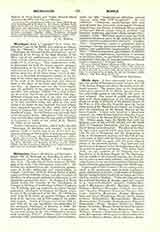

Middendorp, JAKOB, theologian and historian; b. about 1537 at Oldenzaal, or, according to others, at Ootmarsum, Overyssel, Holland; d. at Cologne, January 13, 1611. He calls himself Otmersensis on the title-page of his work, “De celebrioribus Academiis”. He studied the humanities at the Fraterherren gymnasium of Zwolle, philosophy and jurisprudence at Cologne University, where he became doctor of philosophy and both branches of law, and also licentiate of theology; he also taught peripatetic philosophy at the Montanum gymnasium there. He remained in West-phalia during the troubles in the Archdiocese of Cologne in the time of Archbishop Gebhard Truchsess von Waldburg, and was professor at various foreign academies; afterwards he returned to Cologne, where he passed the greater part of his life. In 1580 he became dean of St. Maria ad gradus, Cologne, in 1596 dean of St. Andreas, and in 1601 canon of the cathedral chapter. Rector of Cologne University 1580-81 and 1602-04, he was appointed vice-chancellor by the coadjutor, Ferdinand of Bavaria, in 1602. He lies buried in the church of St. Andreas. As an author he was best known by his “De celebrioribus universi orbis Academiis, libri II” (Cologne, 1567, 1572, 1594, and lastly 1602), considerably enlarged, in two volumes, under the title “Academiarum celebrium universi terrarum orbis libri VIII locupletati”. He also published: “Officiorum scholasticorum libri duo, quorum prior tam iuventutis quam populi Christiani magistrorum, qui divinas et humanas literal publice privatimque docent, munus edisserit, posterior vero prweipua auditorum populique officia complectitur” (Cologne, 1570); “Historiam Aristeee versae per LXX interpretes Scriptures sacrae ex MS. colic bus Gnecis et Latinis restituit et commentario illustravit” (Cologne, 1578); “Imperatorum, regum et principum clarissimorumque virorum quwstiones theologian, juridicae et politicae cum pulcherrimis responsionibus” (Cologne, 1603); “Historia monastica, quae religiose et solitariae vitae originem, progressiones, incrementa et naturam ex Scriptura Sacra, ex pontificio et Caesareo jure, ex antiquissimis historiis, ex veterum Patrum et librorum scriptis demonstrat” (Cologne, 1603).
FRIEDRICH LAUCHERT

